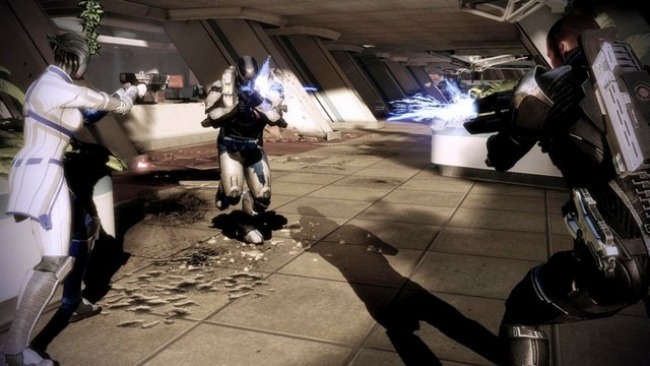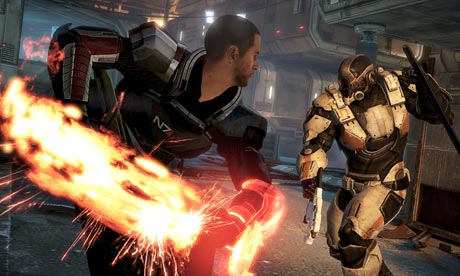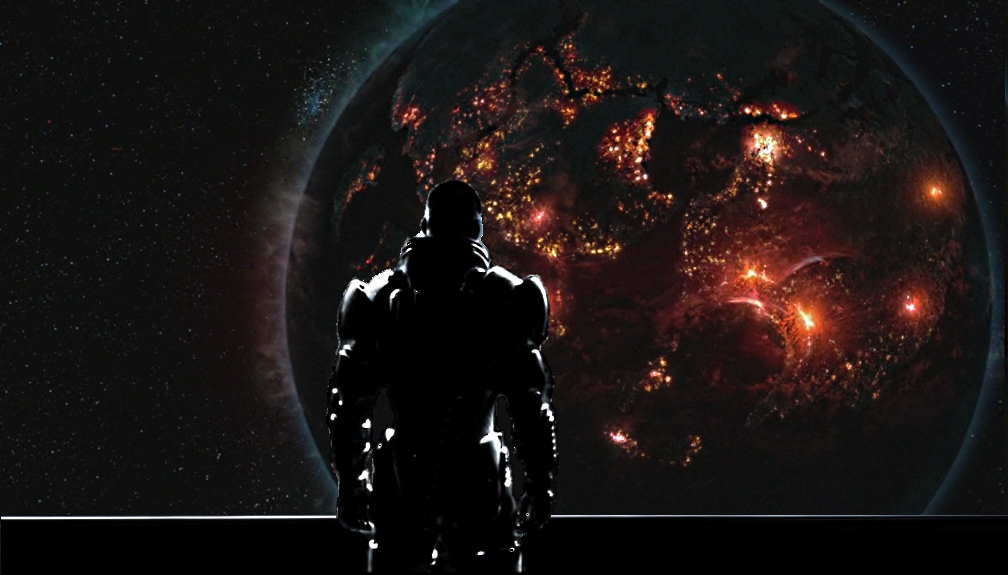Search
[{{{type}}}] {{{reason}}}
{{/data.error.root_cause}}{{{_source.title}}} {{#_source.showPrice}} {{{_source.displayPrice}}} {{/_source.showPrice}}
{{#_source.showLink}} {{/_source.showLink}} {{#_source.showDate}}{{{_source.displayDate}}}
{{/_source.showDate}}{{{_source.description}}}
{{#_source.additionalInfo}}{{#_source.additionalFields}} {{#title}} {{{label}}}: {{{title}}} {{/title}} {{/_source.additionalFields}}
{{/_source.additionalInfo}}Mass Effect 3 (Xbox 360)

Mass Effect 3
Publisher: EA
Developer: Bioware
Released: March 6, 2012
ESRB Rating: Mature for Blood, Partial Nudity, Sexual Content, Strong Language, and Violence
Available on: Xbox 360 (version reviewed), PS3, PC
Genre: Action/RPG
It's tough to write an ending, and Bioware was never one for goodbyes. In 2007, five years ago, the first Mass Effect was released; I was nineteen years old and struggling with finding meaning in my life. I was running out of excuses for games, because they were starting to seem hollow and pointless. Critically, three games were released within a week of one another that challenged that perception: the first Mass Effect was one of these.
By the second entry in the series, much of roughness associated with the first game had been smoothed out, but the focus on storytelling – story that continued from the previous game, defined by choices that you made – had continued, refined with an emphasis on the characters and relationships you build. This resulted in a large cast, populated by some of the most expansive characters in a Bioware game this side of Baldur's Gate II, which is certainly not a bad thing.
Mass Effect 3, then, is inherently more focused, but also has the (surely unpleasant) task of wrapping up every loose end from both games in the series that came before, including downloadable content. This means that, if you missed one or two pieces of story-based downloadable content, you're most likely going to be a little lost when it comes to some of the events referred to in the game.
Bioware did take this into account, however, so while certain elements of the game's plot are handled like this, they're usually briefly mentioned and then moved past. This is not to say that Mass Effect 3 is a game for newcomers to the series to jump into, however; because the story hinges on the choices you made in the games preceding, some familiarity with the content is essentially required.
Stepping once more into the shoes of Commander Shepard, players are faced with a very different landscape than that which has greeted them in either previous Mass Effect tale. The coming war, predicted by Shepard in both games previous, is finally here, and with it both existential and xenophobic crises come to a head. The landscape of Mass Effect 3 is a far more political one than has been explored in the past, but it's also more violent, fully exploring depravities heretofore untouched in the mythology of the games proper (this is not speaking to the transmedia properties).
Like Mass Effect 2, ME3 is a streamlining of the content of the previous game, alongside new elements. What it comes out to is equal parts Gears of War and Mass Effect 1. There's more role-playing game stuff here, to be sure (stats play a much bigger role in combat), but movement feels very much like Epic's blockbuster series, and that's likely no coincidence.

Strong Points: Successfully follows up on many story threads from previous games; combat has received a definite overhaul; graphics seem to have had an extra coat of polish added to them; for those who clamored for it (was there anyone?), multiplayer has finally been added to the proceedings; more or less successfully combines the combat and RPG underpinnings of the first and second games into a cohesive whole
Weak Points: Arguably the weakest ending to the trilogy, which may baffle some players due to its portentious, philosophical manner; not every question is answered; for those who didn't want it, multiplayer has been regrettably added to the game.
Moral Warnings: Combat involves shooting enemies, both human and alien, with some blood spatter; some profanity is featured, most of which - if not all - wouldn't be out of place in a PG-13 film (some dialogue, notably Jack's, does have profanity that would be featured in an R-rated film); optional romances are again included, this time with less revealing camera shots (or none at all, depending on the character); the game requires moral decisions to be made, which can result in the genocide of an entire race, or the suicide of an individual. Despite the disturbing fare, this is handled tastefully, with an emphasis towards the emotional impact of what was just done.
In fact, movement feels indefinably different. It might be that the camera is pulled closer to Shepard's back. It might just be that there's an upgraded animation system at play here. Either way, it's difficult to get used to but once it clicks, it works, and it works quite well.
Much of this is due to the significant visual upgrade that Bioware gave the game over Mass Effect 2. Featuring a heavily modified version of the Unreal Engine 3, Mass Effect 3 runs smoothly, plays smoothly and has spectacular set pieces that are designed to strain just what the engine can handle (which is quite a lot, as evidenced by Gears of War 2 and 3).
One of the difficulties in writing a review for Mass Effect 3 is that one must, typically, attempt to refrain from overly comparing the game to what came before; in this case, that's near impossible. Mass Effect 2 left such an indelible impression on my mind (as well as the minds of many other gamers). It is the dark, ambitious masterwork of the series. It is The Empire Strikes Back, content with exploring dark corners of the psyche and developing character and relationship and not really wrapping anything substantial up.
This somehow makes Mass Effect 3 both a triumph and a letdown. The violence of its arc – inherent in developing a story in the way this one has been developed – is unavoidable. I have seen beloved crewmembers kill themselves. I have saved lives; I have killed entire races in acts of mistaken selflessness. More than once I found myself emotionally rattled by the game, compelled forward but unable to look.

Higher is better
(10/10 is perfect)
Game Score - 96%
Gameplay - 19/20
Graphics - 10/10
Sound - 9/10
Stability - 5/5
Controls - 5/5
Morality Score - 69%
Violence - 6/10
Language - 5/10
Sexual Content - 5.5/10
Occult/Supernatural - 10/10
Cultural/Moral/Ethical - 8/10
This does not happen by just picking the game up and experiencing it as a standalone experience: this is the result of hundreds of hours of gameplay, hours of talking to characters that I grew to love and care for. I was – am – invested in their fates, entwined as I was in the story of their lives.
Mass Effect 3 is not a game that can be referred to without referencing the preceding titles.
Still, it can be appreciated independently.
The universe that Bioware has created here is undeniably beautiful, its varying worlds lush and magnificent. The backgrounds pop. I remember, years ago, first playing The Lord of the Rings: The Return of the King on the Gamecube. Sprawling battlefields below me as I ran along a wall. Innumerable enemies, spread on the ground, marching in formation. It struck me as beautiful, impressive, unmatched. Bioware has here done something similar: ships explode in the sky above as you run below; Reapers claw at the ground, crushing ground forces; coordinated missiles launch towards the massive antagonists, exploding harmlessly against their sides.
None of this is focused on or presented in cinematic cutscenes, but it paints a fiction of war, a believable one not sugarcoated in some austere beauty with which so many games seem obsessed of late. To that end, however, much of the conversational choice has been seemingly removed from the game, removing one of the key aspects of the Mass Effect universe, the very concept of player agency.
It could be argued, then, that this is the most linear title in the series, and indeed, in Bioware's entire repertoire. The simple fact is, throughout the entire game, there's a schizophrenic design mechanic going on: player agency is extolled, with the idea that what the player does has a vital role in the fate of the universe; on the other hand, there is a clearly defined ending that Bioware had in mind, and they take every chance they can to redirect the player towards that ending, through non-interactive cutscenes, through events that the player cannot hope to avoid.

By the end – because of the ending, despite the ending – Mass Effect 3 is impossible to see as anything but the sum of its parts. Its journey is incredible, filled with memorable moments and the recursive inevitability of fate and the choices that you make. It is a vital game, exemplary of its generation and the climate in which it was made; hearkening back to the philosophical science-fiction of so many years ago, it longs to be the type of story that can be subtly told and handled with care and total creator control. But Mass Effect was never that type of series, so for all of the artistry involved it ultimately falls short, which is in no small part the fault of audience expectations. This doesn't make Mass Effect 3 anything less than what it should be, but it's tainted by player perception, and that colors the understanding of a wonderful, flawed game.
Of course, I should probably justify that "wonderful, flawed" statement.
Let's put it like this: the Mass Effect franchise is the single most ambitious science-fiction franchise in the last twenty years. Not only is it a transmedia property (its story covers three console games, two mobile games released on the iOS platform, several comic lines, novels, animated films and more), but also one that has achieved remarkable storytelling fluidity across all properties.
However, the franchise's finest hour – Mass Effect 3, supposedly the culmination of the series – ends on what some might call a sour note. There is not much resolution. What is there is arguable in the quality of its writing, in that it has a serious change in tone and pacing from the rest of the game. For some gamers, this won't be a problem; for others, it will define and mar the entire experience.
The other problem here is the pacing.
Where Mass Effect 2 succeeded is where Mass Effect 3 failed. The former game was a triumph of pacing and methodological game design. There was a defined pacing to the game, like the developers were taking their time, making it like they wanted without constraint. It unfurled at your speed, with plenty of quests and sidequests and little nods to the first game and what was to come.
Indeed, though I have above called it darker, it is also a tonally lighter game than Mass Effect 3: there is no air of finality, of death through the proceedings. More importantly, Bioware isn't trying to channel the player, so that oft-touted concept of "player agency" – the player having some ultimate effect on the story, and where it goes – isn't as much of an issue as it is in Mass Effect 3.
None of which is to say that Mass Effect 3 is a bad game, just a very different one from its predecessor.
The pacing is different. So is the movement within the game space. The game is inordinately preoccupied with death and the end of things: in the first fifteen minutes of the game, Earth is laid to waste. Bioware notably attempts to spread their emotional wings, as it were, in this sequence and comes up surprisingly short, predictably. That isn't to say that Mass Effect didn't end up moving me, but the initial sequence had me rolling my eyes.

The third game does feature sidequests, but they feel more avoidable and less substantial than the first two games. Both the first and second Mass Effect titles had quests related to your squad; this is a Bioware standby, carried on by the recent (and excellent) Dragon Age 2. Yet this is strangely absent in Mass Effect 3, replaced with hollow-feeling sidequests and former crew-related missions (helping out Miranda or Thane). Most of the substantial missions involving Shepard's former crew are referenced to or directly affect the main story, anyway, and the non-vital ones are only for the Mass Effect faithful, reinforcing the idea that this game is meant for existing fans only.
There's also a not-insubstantial multiplayer mode that ties pretty significantly into the main story of the game, included with Mass Effect 3. It's a cooperative mode that pits teams of players against waves and waves of increasingly difficult enemies, not unlike Horde in Gears of War 2 and 3, or Firefight in the more recent Halo titles. Personally, I didn't get much mileage out of it. I've never been much of one for multiplayer outside of a few specific games, and I don't like the idea of mixing multiplayer in with my epic RPG time, even if that multiplayer has some slight impact on the single player game (as it does in Mass Effect 3). That said, it's there for those who want it, and it carries the same weight as combat in the single player game does: fast, tight shooting action (with an emphasis on that).
What else can be said about Mass Effect 3? That it is a remarkably satisfying experience, but your mileage will vary depending on your taste for vaguely philosophical sci-fi? That it is a violent game, filled with blood, of mostly hideous creatures, but also of Cerberus, a pro-human organization that is working towards unknown ends, but certainly against Shepard and his mission? These and more are certainly true, as is the darker enemy design (Banshees are truly disturbing, overpowered monstrosities), and the darker overtones (I have seen characters commit suicide and entire worlds vanish, at my behest, or because of my decisions).
None of this speaks to the (perhaps somewhat questionable) decision to include homosexual relationships in the game, or the lack of focus on romance in the game, compared to previous Bioware titles. Nor does it speak to Bioware's growing feeling of maturity, which has resulted in the writers tackling harder topics, as well as incorporating more and more profanity (granted, in a more restrained fashion than most M-rated titles).
With all of that said, why do I have such mixed feelings about the finale of the Mass Effect saga? It is a great game, a testament to design and storytelling, but it's also vaguely unsatisfying. It could be that, in the end, it's the end of a journey that took five years and hundreds of hours to complete. Or maybe the pervading sense of death overpowered the piece, and so finality felt anything but triumphant and hopeful. In any case, it is magnificent, bolstered by heavy themes and this wonderfully depicted war-torn universe, upon which we have been granted the honor of leaving an imprint all our own. As far as I know, that's not been attempted in a game before.
For all of its failures, for every triumph, in Mass Effect 3 there has been attempted an ambitious, innovative task no game has truly striven so hard to reach. In that, there is the sense – however unreal – that this isn't really my choice, that this isn't really the impact that I had, but the illusion is there. And if nothing else, story is about the illusion, about never seeing the hand of the creator to sell the universe. For the most part, until the end, Bioware has achieved that, and should be commended.




